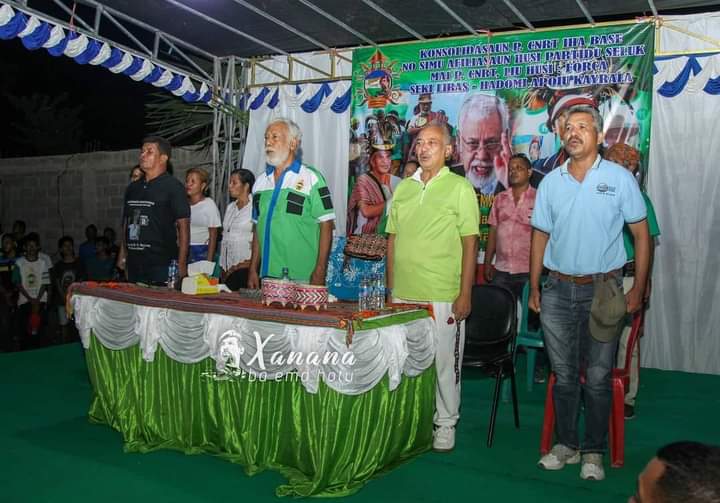Dili, 22 May 2023 (Lusa) – The National Congress for the Reconstruction of Timor-Leste (CNRT), led by Xanana Gusmão, won Sunday’s elections in Timor-Leste, when the counting of votes is practically concluded, and it remains to be determined whether absolute majority.
The victory will give the party a wide parliamentary representation, taking at least 31 of the 65 seats in parliament (10 more than it currently has), according to the provisional national results of the Technical Secretariat for Electoral Administration (STAE).
At the moment, it only remains to complete the tabulation in three municipalities – Bobonaro, Covalima and Manatuto -, with the count in the three cases already well advanced and the CNRT leading in all.
When 92.73% of polling centers across the country are counted – and the trend that has remained practically unchanged since the beginning of the count continues -, the CNRT leads with 263,931 votes and 41.59%, a result superior to the votes obtained by the three political forces that make up the current government.
If it does not reach a majority of 33 seats, the CNRT will have to make an agreement with the Democratic Party (PD), which would give the two political forces a clear majority, although mathematically an absolute majority is still possible, taking into account the votes that need to count.
The Democratic Party (PD) went from fourth to third political force in number of votes, reversing a downward trend in support for the party that had been maintained since the 2007 elections, winning one more seat for a total of six. Obtained for now 57721 votes or 9.09%.
In second place was the Revolutionary Front of Independent Timor-Leste (Fretilin), which currently has 166,147 votes and 26.18%, which means losing four of its current 23 seats.
The results show that Government parties are being punished, in particular the Popular Liberation Party (PLP) of the Prime Minister, Taur Matan Ruak, which loses half of its eight seats in parliament, moving from third to fifth political force.
Taur Matan Ruak is one of the biggest losers in Sunday’s poll, with voters fleeing the political force that debuted as the third most voted in 2017, now standing at 37,701 votes and 7.25%.
The Revolutionary Front of Timor-Leste Independente (Fretilin), led by Mari Alkatiri, was also penalized, with the party that has made the executive possible since 2020 registering the worst percentage of support ever, with a drop of about eight percentage points compared to the vote. which he obtained in advance of 2018.
Finally, the Kmanek Haburas National Unity Timor Oan (KHUNTO) managed to increase its support, to 7.25% and should keep the current five seats. who fell below the eligibility threshold (4% of the valid votes) representing less than 10% of the total votes.
This value is lower than in 2017, when it reached 14% and in 2012, when it guaranteed more than 23.13%.
The CNRT won throughout the diaspora, in nine of the 13 municipalities in Timor-Leste already selected (it lost only to Fretilin in Baucau and Viqueque) and also in the Special Administrative Region of Oecusse-Ambeno (RAEOA), an area that has practically always been managed by a Fretilin leader.
Parliament is now left with just five party benches (there were eight before Sunday’s vote) with only two of the remaining 12 competing political forces coming close to the barrier of 4% of the valid votes: the debutant Partido Os Verdes de Timor (PVT) and the Unity and Democratic Development Party (PUDD), which had a seat in parliament.
Sunday’s suffrage was marked by increased participation by the Timorese diaspora, driven in particular by young emigrants who had registered in the last year, with never-before-seen numbers of people joining the vote.
In one of the polling centers in the United Kingdom, the turnout was so high that those responsible for the National Elections Commission (CNE) and STAE had to place a second ballot box to receive votes.
Images of the vote in places as diverse as Melbourne, Seoul, Lisbon or Crewe showed long queues, with election officials and diplomats referring to the enthusiasm of voter participation.
The counting of votes was hampered by internet problems, which delayed the communication of the results of some municipalities to Dili, with criticism of the way in which STAE released the results.
A situation that even led the Timorese President, José Ramos-Horta, to state that he will request an international audit of the process of disclosing electoral data which, more than 30 hours after the polls closed, were still not known.
ASP // PJA
Lusa/End





